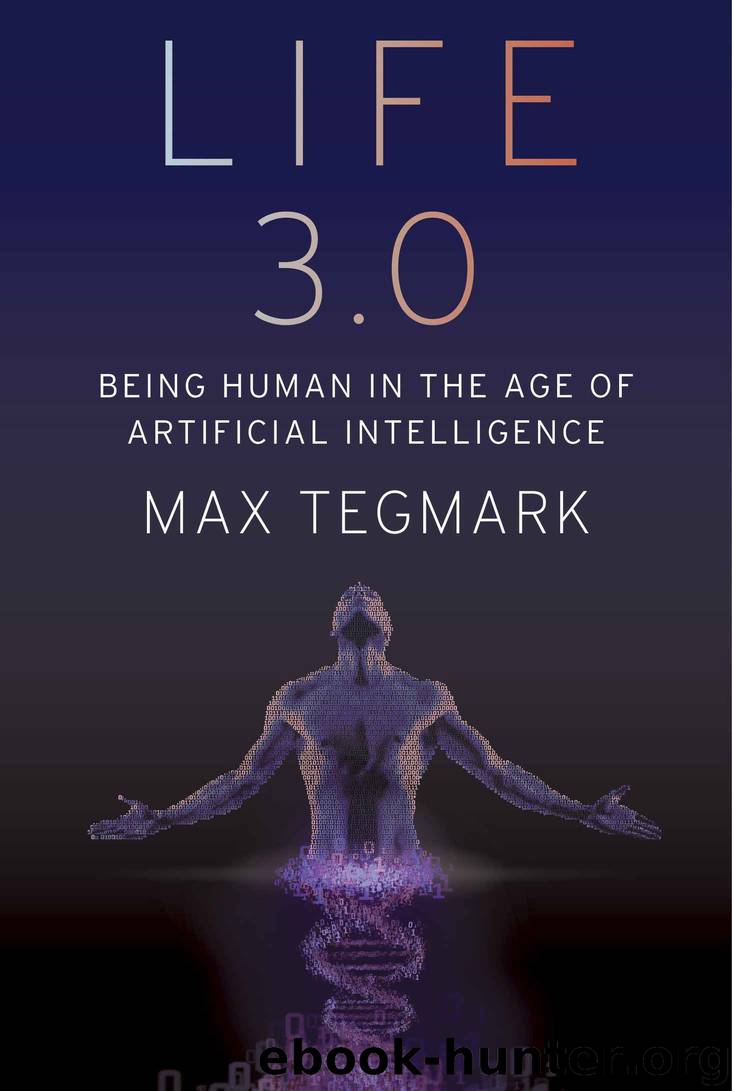Life 3.0: Being Human in the Age of Artificial Intelligence by Tegmark Max

Author:Tegmark, Max [Tegmark, Max]
Language: eng
Format: epub, azw3, mobi
Publisher: Knopf Doubleday Publishing Group
Published: 2017-08-29T04:00:00+00:00
Protector God
If we’re willing to use a superintelligent Gatekeeper AI to keep humans in charge of our own fate, then we could arguably improve things further by making this AI discreetly look out for us, acting as a protector god. In this scenario, the superintelligent AI is essentially omniscient and omnipotent, maximizing human happiness only through interventions that preserve our feeling of being in control of our own destiny, and hiding well enough that many humans even doubt its existence. Except for the hiding, this is similar to the “Nanny AI” scenario put forth by AI researcher Ben Goertzel.2
Both the protector god and the benevolent dictator are “friendly AI” that try to increase human happiness, but they prioritize different human needs. The American psychologist Abraham Maslow famously classified human needs into a hierarchy. The benevolent dictator does a flawless job with the basic needs at the bottom of the hierarchy, such as food, shelter, safety and various forms of pleasure. The protector god, on the other hand, attempts to maximize human happiness not in the narrow sense of satisfying our basic needs, but in a deeper sense by letting us feel that our lives have meaning and purpose. It aims to satisfy all our needs constrained only by its need for covertness and for (mostly) letting us make our own decisions.
A protector god could be a natural outcome of the first Omega scenario from the last chapter, where the Omegas cede control to Prometheus, which eventually hides and erases people’s knowledge about its existence. The more advanced the AI’s technology becomes, the easier it becomes for it to hide. The movie Transcendence gives such an example, where nanomachines are virtually everywhere and become a natural part of the world itself.
By closely monitoring all human activities, the protector god AI can make many unnoticeably small nudges or miracles here and there that greatly improve our fate. For example, had it existed in the 1930s, it might have arranged for Hitler to die of a stroke once it understood his intentions. If we appear headed toward an accidental nuclear war, it could avert it with an intervention we’d dismiss as luck. It could also give us “revelations” in the form of ideas for new beneficial technologies, delivered inconspicuously in our sleep.
Many people may like this scenario because of its similarity to what today’s monotheistic religions believe in or hope for. If someone asks the superintelligent AI “Does God exist?” after it’s switched on, it could repeat a joke by Stephen Hawking and quip “It does now!” On the other hand, some religious people may disapprove of this scenario because the AI attempts to outdo their god in goodness, or interfere with a divine plan where humans are supposed to do good only out of personal choice.
Another downside of this scenario is that the protector god lets some preventable suffering occur in order not to make its existence too obvious. This is analogous to the situation featured in the movie The Imitation Game,
Download
Life 3.0: Being Human in the Age of Artificial Intelligence by Tegmark Max.azw3
Life 3.0: Being Human in the Age of Artificial Intelligence by Tegmark Max.mobi
This site does not store any files on its server. We only index and link to content provided by other sites. Please contact the content providers to delete copyright contents if any and email us, we'll remove relevant links or contents immediately.
Thing Explainer by Randall Munroe(3421)
The Elements by Theodore Gray(2510)
Make by Mike Westerfield(2008)
The Meaning of it All by Richard Feynman(1965)
Hands-On Genetic Algorithms with Python by Eyal Wirsansky (2020) by Unknown(1797)
Every Tool's a Hammer by Adam Savage(1501)
Science Experiments You Can Eat by Vicki Cobb(1493)
The Perfectionists by Sara Shepard(1477)
Raspberry Pi Electronics Projects for the Evil Genius (Tab) by Norris Donald & Norris Donald(1423)
Martin Gardner's Science Magic by Martin Gardner(1398)
The Perfectionists by Simon Winchester(1309)
Elephants on Acid: And Other Bizarre Experiments by Alex Boese(1292)
Handbook of Modern Sensors by Jacob Fraden(1271)
Elephants on Acid by Boese Alex(1269)
Synchrotron Light Sources and Free-Electron Lasers by Eberhard J. Jaeschke Shaukat Khan Jochen R. Schneider & Jerome B. Hastings(1265)
Tesla by Carlson W. Bernard(1217)
The Science of Food by Marty Jopson(1196)
The Meaning Of It All by Richard P. Feynman(1163)
125 Physics Projects for the Evil Genius by Silver Jerry(1154)
